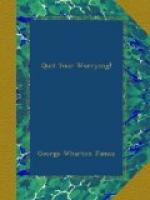I verily believe that the parent who forever is saying “Don’t” to her children, is as dangerous as a submarine and as cruel as an asphyxiating bomb. Life is for expression, not repression. Repression is always a proof that a proper avenue for expression has not yet been found. Quit your “don’t-ing,” and teach your child to “do” right. Children absolutely are taught to dread, then dislike, and finally to hate their parents when they are refused the opportunity of “doing”—of expressing themselves.
Rather seek to find ways in which they may be active. Give them opportunities for pleasure, for employment, for occupation. And remember this, there is as much distance and difference between “tolerating,” “allowing,” “permitting” your children to do things, and “encouraging,” “fostering” in them the desire to do them, as there is distance between the poles. Don’t be a dampener to your children, a discourager, a “don’ter,” a sign the moment you appear that they must “quit” something, that they must repress their enthusiasm, their fun, their exuberant frolicsomeness, but let them feel your sympathy with them, your comradeship, your good cheer, that “Father, Mother, is a jolly good fellow,” and my life for it, you will doubtless save yourself and them much worry in after years.
Hans Christian Andersen’s story of The Ugly Duckling is one of the best illustrations of the uselessness and needlessness of much of the worry of parents with which I am familiar. How the poor mother duck worried because one of her brood was so large and ugly. At first she was willing to accept it, but when everybody else jeered at it, pushed it aside, bit at it, pecked it on the head, and generally abused it, and the turkey-cock bore down upon it like a ship in full sail, and gobbled at it, and its brothers and sisters hunted it, grew more and more angry with it, and wished the cat would get it and swallow it up, she herself wished it far and far away. And as the worries grew around the poor duckling, it ran away. It didn’t know enough to have faith in itself and its own future. The result was the worries of others affected it to the extent of urging it to flee. For the time being this enlarged its worries, until at length, falling in with a band of swans, it felt a strange thrill of fellowship with them in spite of their grand and beautiful appearance, and, soaring into the air after them, it alighted into the water, and seeing its own reflection, was filled with amazement and wonder to find itself no longer an ugly duckling but—a swan.
Many a mother, father, family generally, have worried over their ugly duckling until they have driven him, her, out into the world, only to find out later that their duckling was a swan. And while it was good for the swan to find out its own nature, the points I wish to make are that there was no need for all the worry—it was the sign of ignorance, of a want of perception—and further, the swan would have developed in its home nest just as surely as it did out in the world, and would have been saved all the pain and distress its cruel family visited upon it.




